If you’re wondering how GoHighLevel works with Shopify, you’re not alone.
Many eCommerce store owners love Shopify for managing products, inventory, and online sales – but quickly realize it doesn’t offer the advanced CRM, marketing automation, and customer follow-up tools needed to maximize sales.
That’s where GoHighLevel comes in.
GoHighLevel is designed for capturing leads, managing pipelines, and automating campaigns across email, SMS, and more.
Shopify, on the other hand, is one of the most popular eCommerce platforms, powering over a million online stores worldwide.
Connecting the two gives you the best of both worlds: Shopify handles product sales, while GoHighLevel powers the backend automation that drives repeat purchases and customer loyalty.
Here are a few things you can automate once GoHighLevel and Shopify are connected:
- Send instant SMS/email order confirmations to buyers.
- Tag customers in GoHighLevel for upsells and retargeting.
- Recover abandoned carts with automated follow-ups.
- Collect reviews automatically after delivery.
In this guide, I’ll walk you through how to connect GoHighLevel and Shopify, and share practical automations you can set up to save time, boost sales, and deliver a better customer experience.
Key Takeaways:
- GoHighLevel and Shopify can work together using Zapier, Pabbly, Make, or API/webhooks – letting you sync orders and customer data seamlessly.
- Shopify handles storefront, products, and payments, while GoHighLevel takes care of CRM, automation, and customer follow-ups.
- This integration turns every Shopify order into an automated journey with instant confirmations, upsells, abandoned cart recovery, and review requests.
Can You Use GoHighLevel with Shopify?
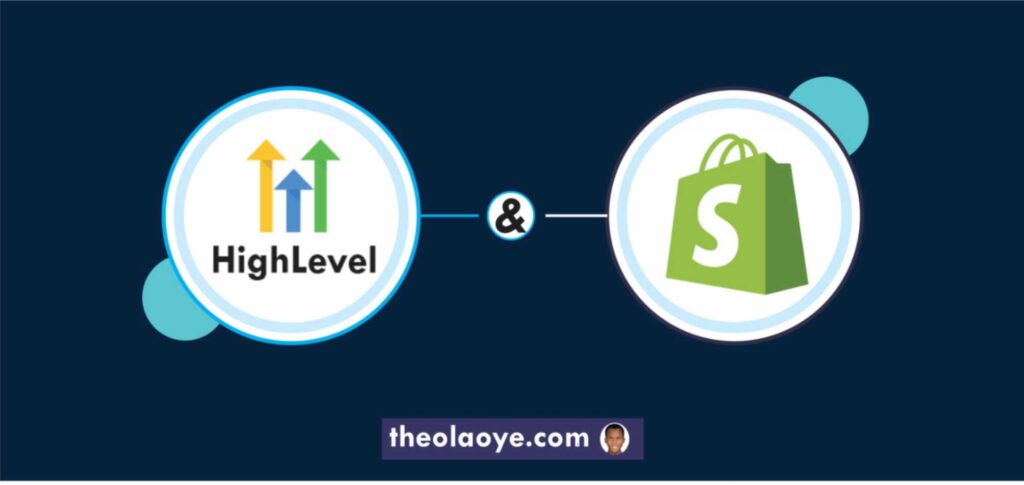
Yes – you can use GoHighLevel with Shopify, but there isn’t a direct, native integration.
Instead, the two platforms are connected through tools like Zapier, Pabbly Connect, or Make (Integromat), as well as through GoHighLevel’s API and webhooks.
These connectors allow you to sync customer and order data from Shopify into GoHighLevel, where you can run automations that drive more sales and repeat business.
Here’s how it works in practice:
- Shopify as the Trigger: When a customer places an order, Zapier (or another connector) pushes that order data into GoHighLevel, creating or updating a contact.
- GoHighLevel as the Action: You can then use that data to trigger workflows, such as sending an SMS confirmation, tagging the buyer, or starting a post-purchase email campaign.
- Order and Customer Data Sync: Key fields like name, email, phone number, order ID, and order value can be mapped directly into GoHighLevel so you always have an updated customer record.
Setting Expectations
- Shopify continues to manage your storefront, products, and payments.
- GoHighLevel becomes your automation and CRM engine, handling customer communication, follow-ups, and upsells.
- While it’s beginner-friendly to connect via Zapier or Pabbly, more advanced setups with webhooks or APIs are better if you want faster syncing or custom workflows.
In short: Yes, GoHighLevel works with Shopify – and once integrated, you can turn every Shopify order into an automated customer journey inside GoHighLevel.
How to Connect GoHighLevel and Shopify
Since GoHighLevel doesn’t have a native Shopify integration, the most common way to connect both is through Zapier, Pabbly Connect, or Make (Integromat).
You can also use GoHighLevel API/webhooks if you want a more custom solution.
Here’s a practical walkthrough:
Prerequisites
Before you start, make sure you have:
- Admin access to your Shopify store.
- A Zapier or Pabbly Connect account (or developer access if you’ll use the API).
- A GoHighLevel account ready to receive data. 👉 Start your free 30-day GoHighLevel trial here.
Note: If you need a detailed tutorial on how to sign up for GoHighLevel, check this out.
Step 1: Choose Your Connector
Pick the integration tool you’ll use:
- Zapier → Beginner-friendly, easy setup.
- Pabbly Connect → Affordable, especially for higher-volume automations.
- Make (Integromat) → Great for visual workflow building and advanced logic.
(Expectation: Zapier/Pabbly require little to no coding, while API/webhooks usually need a developer.)
Step 2: Create a Trigger in Zapier or Pabbly
Log into Zapier and click Make a Zap as you can see below.
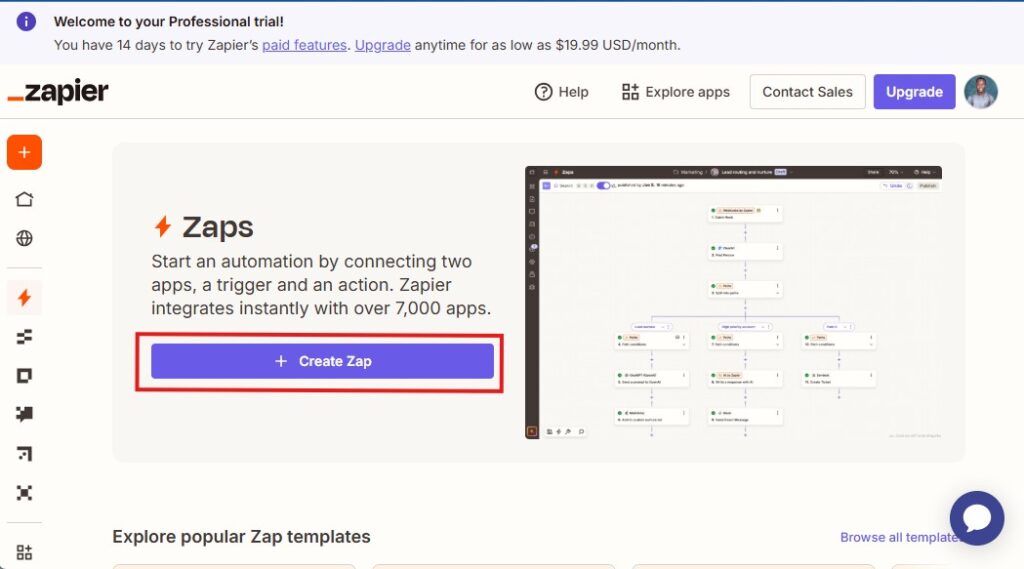
Select Shopify as the Trigger App. You can select Shopify by clicking on the Trigger button.
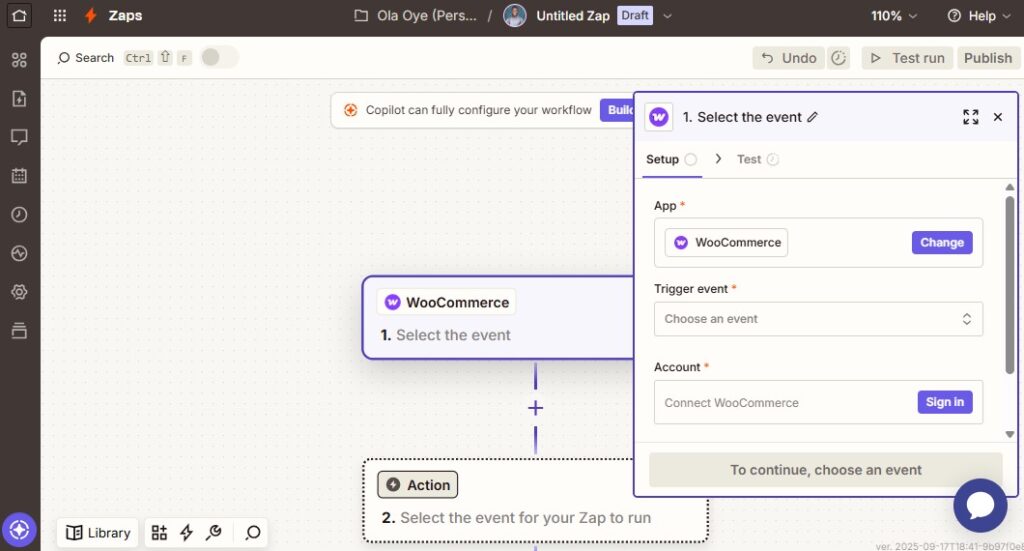
Choose the trigger event – for example:
- New Order
- Order Paid
- Order Status Changed
📌 Pick the event that matches your workflow best. For most stores, “New Order” or “Order Paid” is the safest option.
Step 3: Connect Your Shopify Store
- Enter your Shopify store URL.
- Log in to authorize Zapier or Pabbly.
- Test the connection with a recent order or customer.
Step 4: Send Data to GoHighLevel
- In Zapier, select Webhooks by Zapier as the Action App. The Webhooks is a premium app as you can see below.
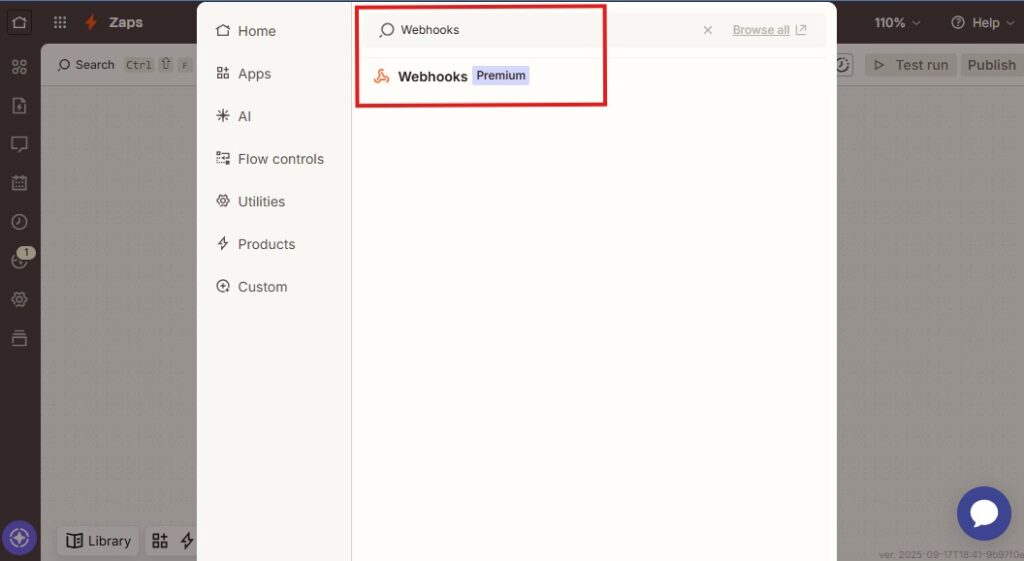
- Select POST to send data to GoHighLevel.
- Inside GoHighLevel, create a Webhook Trigger (Automations → Workflows → Webhook).
- Copy the Webhook URL and paste it into Zapier.
Step 5: Map Your Fields Carefully
Map Shopify data to GoHighLevel fields, such as:
- Customer Name → Contact Name
- Email → Email
- Phone → Phone (for SMS automations)
- Order Total → Custom Field
📌 Example: When a Shopify order is placed, GoHighLevel creates a new contact, tags them as “Shopify Customer,” and starts a post-purchase workflow.
Step 6: Test the Integration
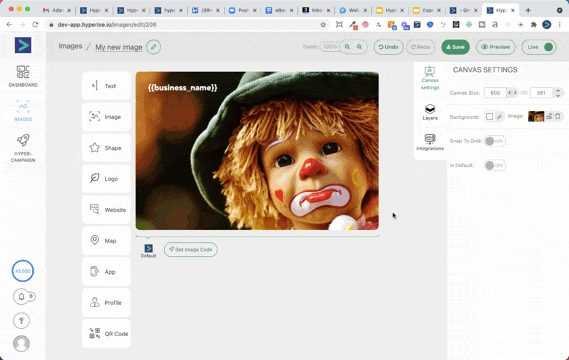
- Place a test order in Shopify.
- Check if the customer appears in GoHighLevel with the right tags and data.
- Verify that automations (SMS, email, or pipeline updates) are triggered.
Step 7: Turn On and Monitor
- Activate your Zap/automation.
- Monitor activity in Zapier/Pabbly and GoHighLevel for the first 48 hours.
- Watch for common issues like phone formatting or missing fields.
Step 8: Build Automations in GoHighLevel
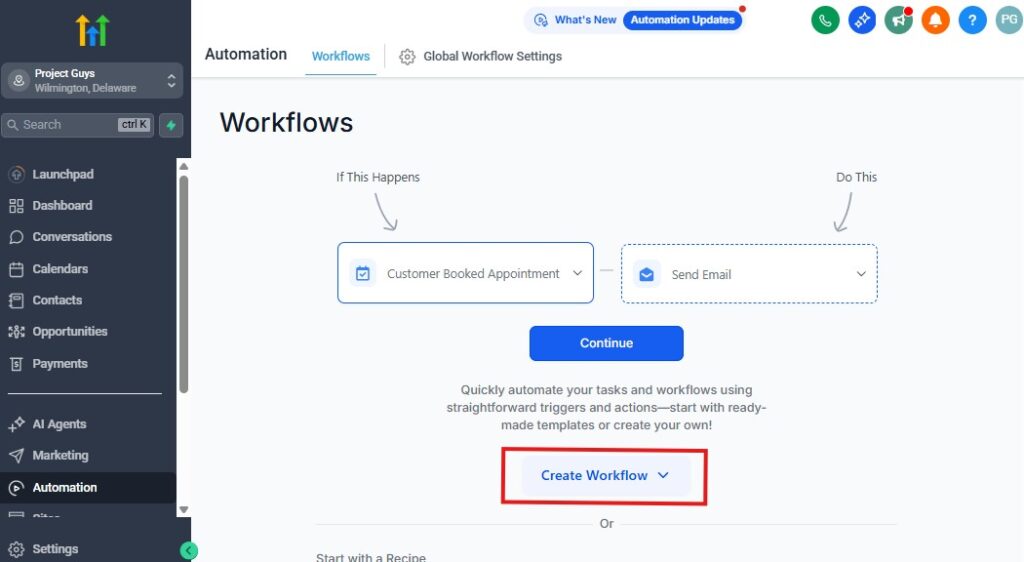
Once data flows in, you can create automations like:
- New order → Send confirmation SMS/email → Tag customer → Add to upsell workflow
- Abandoned checkout → Add to pipeline → Send reminder email sequence
- New customer → Add to loyalty campaign → Trigger review request after 7 days
Pro Tips & Expectations
- Webhooks are fastest; Zapier free plans may delay triggers by a few minutes.
- Payments remain in WooCommerce; GoHighLevel handles CRM, follow-up, and automation.
- Always test refunds and subscriptions – these need extra setup.
- Protect your API keys and follow GDPR/opt-out rules for messaging.
✅ With this setup, every Shopify action becomes a GoHighLevel automation trigger – helping you save time, improve customer experience, and increase repeat sales.
👉 Ready to try it? Start your free 30-day GoHighLevel trial and connect it with WooCommerce today.
Learn More:
Best Use Cases of GoHighLevel and Shopify
When you integrate GoHighLevel and Shopify, you can turn every sale, abandoned cart, or customer interaction into an automated workflow.
Instead of manually following up, you let GoHighLevel handle communication and relationship-building while Shopify powers your storefront.
Here are the best ways to use this integration:
- Automated Order Confirmations
Send instant emails or SMS messages when a Shopify order is placed. This builds trust and reassures customers their order was received.
➡️ If Shopify order placed → Add contact in GoHighLevel → Tag as “New Customer” → Send confirmation SMS/email
- Abandoned Cart Recovery
When a customer leaves items in their cart, Zapier or Pabbly can push that event into GoHighLevel, where you set up automated reminders to bring them back.
➡️ If Shopify checkout abandoned → Add to GoHighLevel pipeline → Trigger 3-day abandoned cart email/SMS sequence
- Post-Purchase Upsells and Cross-Sells
After a customer buys from your Shopify store, GoHighLevel can send upsell offers, personalized product recommendations, or discount codes for their next purchase.
➡️ If Shopify order completed → Tag as “Customer” → Trigger upsell email campaign → Offer 10% off next order
- Customer Review Requests
Use GoHighLevel to automatically send review requests once an order is delivered. This helps you build social proof without manually reaching out.
➡️ If Shopify order marked as fulfilled → Send SMS/email review request → Add to reputation management workflow
- Loyalty & Repeat Purchase Campaigns
Segment customers based on purchase history and trigger loyalty campaigns to encourage repeat sales.
➡️ If customer makes 3+ purchases in Shopify → Tag as “VIP” in GoHighLevel → Enroll in loyalty rewards campaign
By combining Shopify’s eCommerce engine with GoHighLevel’s automation power, you’ll save time, reduce lost sales, and increase customer lifetime value – all while creating a smoother shopping experience.
Benefits of Integrating GoHighLevel with Shopify
When you connect GoHighLevel and Shopify, you combine two powerful platforms – one for selling products and the other for managing customers and automation.
Instead of working in silos, your sales and marketing systems work together, saving you time and boosting revenue.
- Save Time with End-to-End Automation
No more copying order details from Shopify into your CRM. Every purchase, cart abandonment, or customer signup flows directly into GoHighLevel, where automations handle confirmations, follow-ups, and campaigns.
- Improve Customer Experience
Shoppers don’t just want a product; they want reassurance and communication. GoHighLevel ensures every order triggers instant confirmations, timely updates, and even personalized offers. This creates a professional experience that builds trust and loyalty.
- Increase Revenue Through Smart Campaigns
By tagging and segmenting Shopify customers inside GoHighLevel, you can launch tailored email and SMS campaigns.
For example, send a coupon to first-time buyers, create a loyalty sequence for repeat customers, or recover abandoned carts automatically.
- Keep All Data Organized in One CRM
Instead of juggling Shopify dashboards, email tools, and spreadsheets, GoHighLevel centralizes all customer and order data.
This makes it easy to track buyer behavior, run reports, and make informed decisions.
- Scale Without Hiring Extra Staff
As your Shopify store grows, so does the workload – unless you automate it.
With GoHighLevel, reminders, nurture campaigns, upsells, and review requests all run in the background, letting you focus on scaling instead of admin work.
👉 In short: Shopify manages your storefront, while GoHighLevel powers the automation and customer relationship side. Together, they help you sell more, serve better, and scale faster.
Alternatives to Shopify and GoHighLevel Integration
While Shopify is one of the most popular ways to run an online store, it’s not the only option for connecting with GoHighLevel.
Depending on your business type and goals, you may find other eCommerce or payment platforms integrate just as well – or even better.
Here’s a quick comparison:
| Platform | Best For | How It Works with GoHighLevel | Key Advantage |
|---|---|---|---|
| Shopify | Scalable online stores | Sync orders & customers via Zapier/API | Easy to use, full eCommerce features |
| WooCommerce | WordPress-based stores | Connect forms & orders via plugins/Zapier | Great for WordPress users |
| Stripe | Payments & subscriptions | Automates billing, invoices, and upsells | Simple setup, no full storefront needed |
| WordPress | Content-driven service websites | Sync forms & bookings into GoHighLevel | Flexible, good for agencies & services |
1. WooCommerce + GoHighLevel
If your website already runs on WordPress, WooCommerce is a natural alternative to Shopify.
It lets you sell products while keeping your site and eCommerce under one platform, then push order data into GoHighLevel for automation.
2. Stripe + GoHighLevel
If you don’t need a full storefront but want a way to handle payments and subscriptions, Stripe is an excellent lightweight option.
GoHighLevel can automate invoices, upsells, and subscription workflows directly from Stripe data.
3. WordPress + GoHighLevel
For service businesses, agencies, or content-driven sites, WordPress with GoHighLevel is a simple, powerful setup.
You can capture leads through WordPress forms and let GoHighLevel automate the follow-ups, pipelines, and client communication.
Which One Should You Choose?
- ✅ Choose Shopify if you’re building a scalable online store with multiple products.
- ✅ Choose WooCommerce if you already use WordPress and want an integrated store + content site.
- ✅ Choose Stripe if you mainly sell services, subscriptions, or digital products and don’t need a full storefront.
- ✅ Choose WordPress if your business is service-based and focused on lead generation rather than eCommerce.
👉 You can also explore our other guides in this series where we cover GoHighLevel integrations with Shopify, Stripe, and more to help you pick the right setup.
Frequently Asked Questions
Frequently Asked Questions about GoHighLevel and Shopify.
Can you integrate GoHighLevel with Shopify directly?
Not natively. GoHighLevel doesn’t have a built-in Shopify integration, but you can connect both using Zapier, Pabbly Connect, Make (Integromat), or custom API/webhooks.
Do I need coding skills to connect GoHighLevel and Shopify?
No. If you use Zapier or Pabbly, it’s a no-code setup. You just map your Shopify order fields (name, email, phone, order ID, etc.) to GoHighLevel fields.
What can I automate with Shopify + GoHighLevel?
You can send order confirmations, recover abandoned carts, tag customers for upsells, trigger review requests, and run loyalty campaigns.
Does GoHighLevel replace Shopify?
No. Shopify manages your storefront, products, and payments. GoHighLevel handles CRM, automation, and customer follow-up. They work best together.
Will Shopify payments sync into GoHighLevel?
Customer details will sync, but actual payment processing stays inside Shopify. GoHighLevel can still use the synced data to trigger campaigns.
Is this integration beginner-friendly?
Yes. Zapier and Pabbly make it simple for beginners. For more advanced users, Make or API/webhooks allow deeper customization.
People Also Ask
Q: Does GoHighLevel have a Shopify integration?
A: Not directly, but you can connect them using Zapier, Pabbly, or API/webhooks.
Q: What can I do with GoHighLevel and Shopify together?
A: You can automate confirmations, recover carts, upsell customers, and request reviews automatically.
Q: Do I need Zapier for Shopify GoHighLevel integration?
A: Zapier is the easiest option, but Pabbly, Make, or custom API/webhooks also work.
Q: Can GoHighLevel send SMS updates for Shopify orders?
A: Yes. Once Shopify sends order data to GoHighLevel, you can trigger SMS confirmations and reminders.
Q: Is Shopify or WooCommerce better with GoHighLevel?
A: Use Shopify if you want a standalone store, or WooCommerce if you’re already running WordPress.
Final Thoughts
Connecting GoHighLevel with Shopify is one of the best ways to turn your online store into a complete sales and marketing system.
Shopify takes care of the storefront, product management, and payments, while GoHighLevel handles customer follow-ups, automation, and CRM.
By syncing the two, you can:
- Send instant confirmations and updates.
- Recover abandoned carts automatically.
- Run upsell and loyalty campaigns without extra effort.
- Collect customer reviews to boost trust and sales.
This integration gives you more than just an eCommerce store – it creates a full customer journey that builds loyalty and increases revenue on autopilot.
👉 Ready to see it in action? Start your free 30-day GoHighLevel trial here and connect it with Shopify to automate your business today.